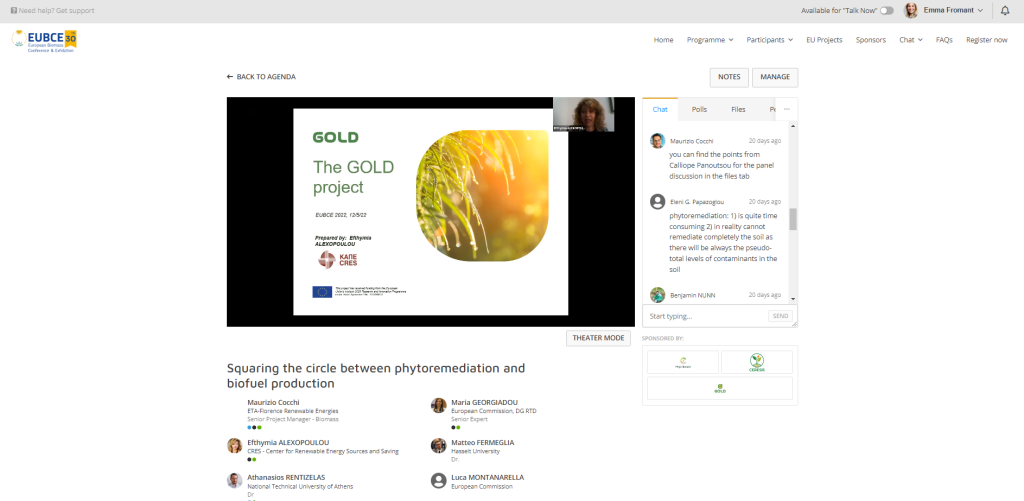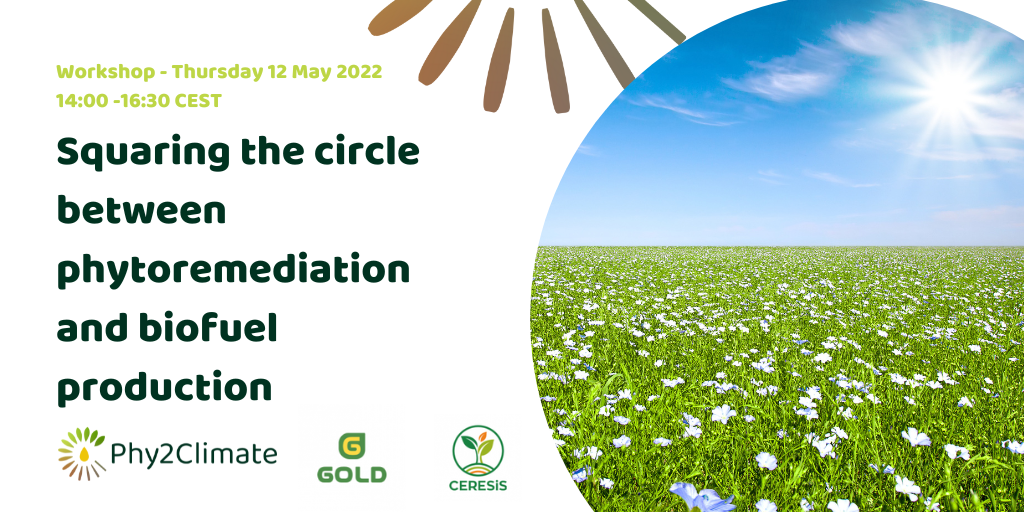Squaring the circle between phytoremediation and biofuel production
On Thursday 12th May 2022, at EUBCE 2022, three similar Horizon 2020 projects: GOLD, Phy2Climate and CERSiS, held a two hour workshop in which the three projects were presented, as well as hearing from european commission experts on the subjects of renewable energy, soil protection and policy.
The workshop commenced with opening remarks from Maria Geogiadou, Senior Expert,
European Commission, DG Research and Innovation, in which she summarised the EUs Green Deal manifesto and the EUs climate and energy policies. The renewable energy commitments for the ‘Fit for 55’ package and REPowerEU were also presented, concluding with a summary on the Horizon Europe programme.
After the opening remarks the three projects were presented, the aim of which is to remediate contaminated sites through the growth of specific contaminate absorbing crops, and then to use such crops as a feedstock to create biofuels. Each of the three projects is using its own method of conversion and different types of crops, all of which was summarised in this workshop.
To finish the first session of the workshop, Luca Montanarella, EC Joint Research Centre, Land Resources Unit, presented a summary of the EU’s Soil Strategy and Soil Observatory. In this informative presentation we hear about the background and history of the EUs legislation and policy regarding soil quality, the importance of soils in the fit against climate change, and the vision the EU has for monitoring and protection. The main goal of the EU soil observatory is to monitor and accurately map contaminated sites throughout Europe, whilst engaging in scientific and citizen working groups.
To conclude, the workshop rounded off with a 45 minute panel discussion, moderated by Matteo Fermeglia, including the following panellists:

Mirco Barbero, EC DG ENV, Policy Officer – Soil protection and sustainable land use
Luca Montanarella, EC JRC, Senior Expert – Sustainable Resources
Marko Perisic, Hasselt University, Belgium
Efthimia Alexopoulou, CRES, Greece
George Vourliotakis, Exergia, Greece
To start with we heard from the three project representatives, of which the discussion revolved mostly around the gaps in policy that would help to bridge the gap between phytoremediation techniques and the production of biofuels. Marko mentioned policy gaps have been identified in different aspects of the project, including those for invasive species, waste management and agricultural, to name a few. Whilst George and Efi touched upon the need for better mapping of contaminated sites and looking toward investment and premiums for this type of value chain.
We also heard from Luca, who gave an overview of the EU’s work on soil health, and highlighted the biggest challenge as the lack of clear definitions in regards to contaminated and degradation land. He also expresses a positive opinion towards the research outcomes of these projects, but highlighted his concern that if contamination is just displaced, this type of remediation and fuel production will not be a valid solution.
Mirco echoed Luca’s comments linked to clear definitions, and also expressed challenges of setting new soil laws. One of which is the need to apply laws that are accepted and implementable by all member states, in some cases this could ensue enormous costs associated with the remediation of contaminated land. Therefore, Mirco views cost cutting a positive aspect, but also that all options will be risk assessed for cost and benefits before being considered as applicable.
In conclusion, the panel agreed that there is huge pressure on all land available in europe, however, to manage it efficiently, not only are clear definitions and mapping of soil status required, but also these value chains should be market driven and economically incentivised.
Finally, the panel discussion finished on a positive note from Luca that by starting at a local scale, with living labs and case studies, and by taking note of what is working well, a bigger solution will be achieved that will be easier to scale-up to European level.
A full recording of the workshop can be found here.


